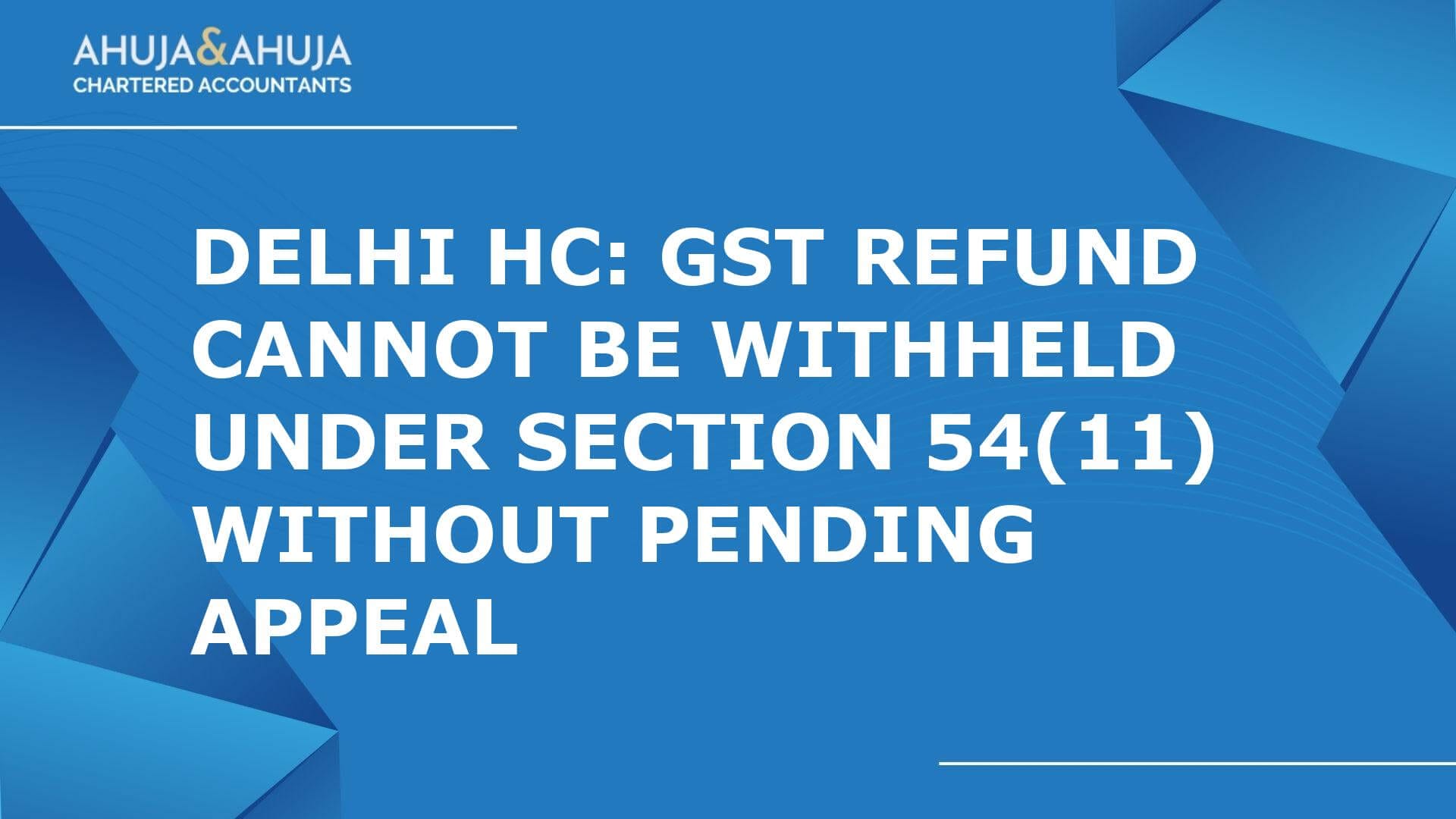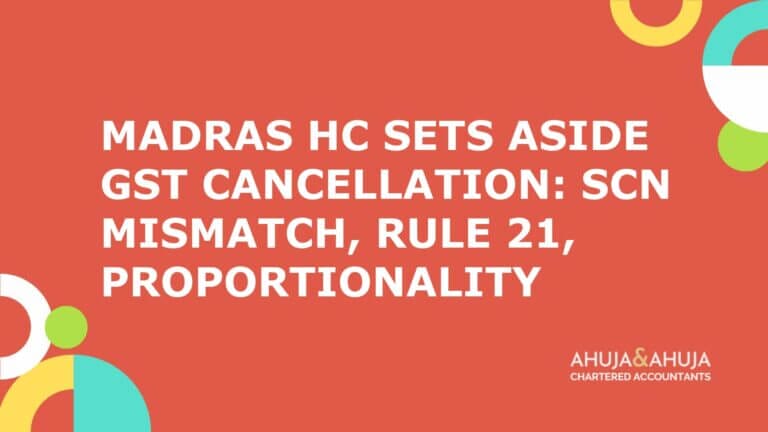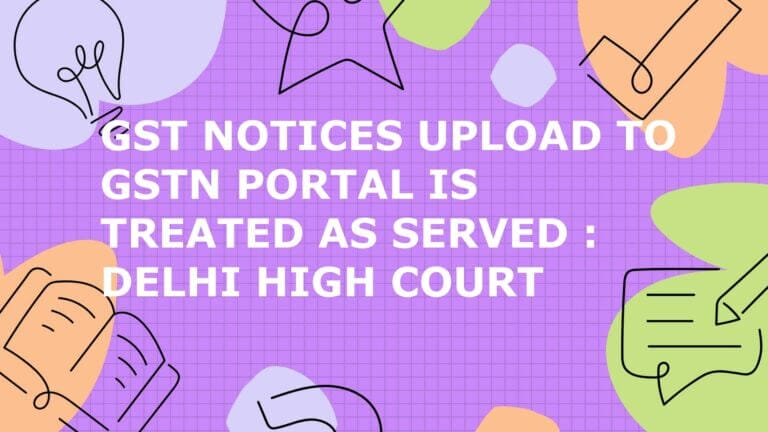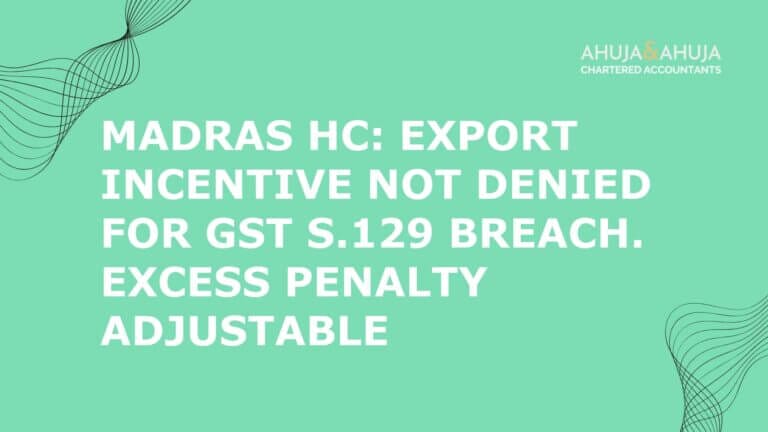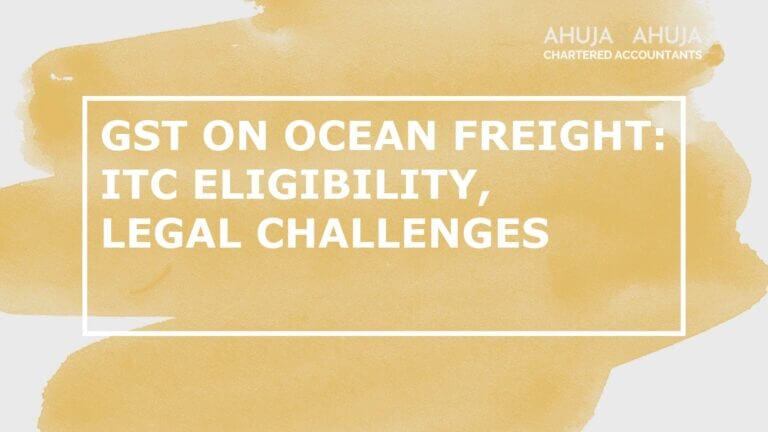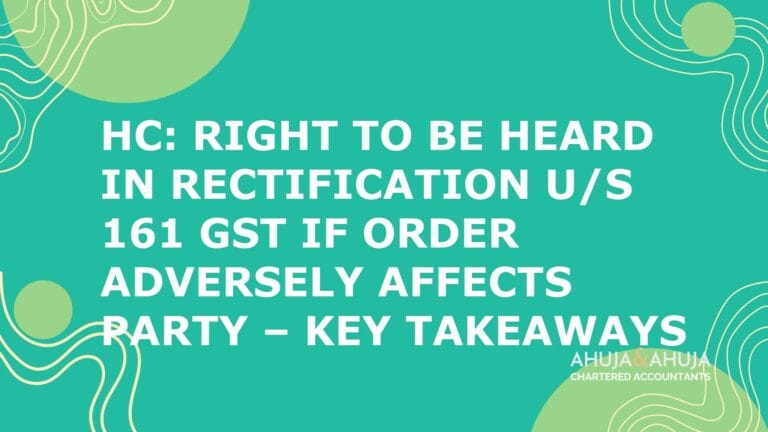Delhi HC: GST Refund Cannot Be Withheld Under Section 54(11) Without Pending Appeal
GST refunds are a lifeline for many Indian businesses, especially exporters and service providers. Yet, the process is often fraught with delays and uncertainty—sometimes due to the Department’s discretionary powers under Section 54(11) of the CGST Act. The recent Delhi High Court decision in Omega QMS v. Commissioner, CGST has brought much-needed clarity, drawing a clear line between lawful and unlawful withholding of refunds. This article unpacks the legal reasoning, practical impact, and what it means for businesses and tax professionals navigating the GST landscape.
Section 54(11) of the CGST Act—What Does the Law Actually Say?
Section 54(11) empowers the Commissioner to withhold a GST refund in certain circumstances. But what are these circumstances, and how far does this power go?
- Text and Structure: Section 54(11) states that if a refund is due and “an appeal or any other proceeding is pending,” and the Commissioner is of the opinion that granting the refund may adversely affect revenue, the refund can be withheld until the appeal or proceeding is decided.
- Legislative Intent: The provision aims to balance two interests—protecting government revenue and ensuring taxpayers are not unfairly deprived of their money. It is not meant to be a blanket power for the Department to delay refunds at will.
- Legal Prerequisites: For the Department to lawfully withhold a refund under Section 54(11), two conditions must be met:
- There must be a pending appeal or other proceeding related to the refund.
- The Commissioner must form an opinion (with reasons) that releasing the refund could harm revenue interests.
A common misconception is that the Department can simply “intend” to appeal and withhold refunds. The law, as clarified by the Delhi HC, is stricter—mere intention is not enough.
The Omega QMS Case—How the Law Was Tested
Factual Background:
Omega QMS, a technical consultancy firm, filed for a GST refund of ?83.46 lakh for FY 2019-20. The Department initially rejected the claim, but the Appellate Authority allowed it, finding no merit in the Department’s objections. Instead of processing the refund, the Department issued a review order expressing its intention to challenge the Appellate Authority’s decision and withheld the refund, citing Section 54(11).
Arguments in Court:
- Petitioner’s Stand: Omega QMS argued that since no appeal or other proceeding was actually pending, the Department’s action was illegal. The Appellate Authority’s order was final and binding unless set aside.
- Department’s Stand: The Department claimed it intended to appeal but was unable to do so as the GST Appellate Tribunal was not constituted. It argued that its review order and opinion under Section 54(11) justified withholding the refund.
Delhi HC’s Interpretation:
The Court examined the statutory language and past precedents (notably G.S. Industries and Shalender Kumar). It held that:
- Legal Thresholds: Both a pending appeal/proceeding and a reasoned opinion are mandatory. The Department cannot act on intention alone.
- Discretion Curtailed: The Commissioner’s discretion is not unfettered. It must be exercised strictly within the statutory framework.
- Key Observations: The Court reaffirmed that the Department’s “intention” to appeal, without actually filing one, does not meet the legal threshold for withholding refunds.
Court’s Rationale:
The Court was clear—Section 54(11) is not a tool for indefinite delay. The Department’s opinion, no matter how strongly worded, cannot substitute for the actual filing of an appeal or initiation of proceedings. The taxpayer’s right to refund crystallises once the Appellate Authority allows it, unless a higher forum is seized of the matter.
When Can Refunds Be Lawfully Withheld? The New Boundaries
- Valid Withholding: Only when an appeal or other proceeding is actually pending, and the Commissioner has formed a reasoned opinion about revenue risk.
- Invalid Withholding: If the Department merely states its intention to appeal, or issues a review order without following through, it cannot withhold the refund.
Practical Example:
If a business wins at the Appellate Authority and the Department has not filed an appeal (even if the Tribunal is not yet set up), the refund must be processed. The Department cannot “reserve” the right to withhold by simply expressing intent.
Departmental Intention vs. Pending Proceedings—A Decisive Distinction
Before this judgment, many businesses faced delays because the Department would cite “intention to appeal” as a reason to hold back refunds. The Delhi HC has now categorically rejected this practice. Only actual, pending proceedings count—not administrative intentions or internal reviews.
Impact:
- Businesses can expect faster refunds after a favourable appellate order.
- The Department must act promptly—either file an appeal or process the refund.
This ruling is particularly important for businesses operating in Delhi and across India, where timely GST refund processing is critical for smooth cash flow.
GST Refunds After Omega QMS: Timelines, Interest, and Practical Strategies
The Delhi High Court’s ruling in Omega QMS doesn’t just clarify the law—it reshapes the day-to-day experience of businesses and tax professionals dealing with GST refunds. Let’s break down what happens next, how to respond to invalid withholding, and what this means for compliance, cash flow, and future planning.
Refund Processing Timelines—No More Indefinite Wait
Once the Appellate Authority allows a refund, the Department’s duty is clear: process and credit the refund promptly. The Court in Omega QMS set a specific deadline—refunds must be credited within two months, and in this case, by 30th September 2025. This sets a strong precedent for time-bound action.
- Department’s Obligation: After a favourable appellate order, the Department cannot delay on the pretext of “intending” to appeal. If no appeal or other proceeding is pending, the refund must be released.
- Consequences for Delay: Administrative inertia is no longer an excuse. Delays beyond the mandated timeline can attract judicial scrutiny and financial consequences.
Key takeaway: Businesses should expect refunds to be processed swiftly post-appellate order, unless the Department has actually filed an appeal or initiated proceedings.
Interest Liability—Section 56: Compensation for Delay
Section 56 of the CGST Act mandates interest on delayed refunds. The Delhi HC reinforced that if a refund is withheld without legal basis, the taxpayer is entitled to interest for the period of delay.
- Statutory Interest: The law prescribes interest (currently 6% per annum) from the expiry of 60 days after the refund application till the date of actual payment.
- Court’s Mandate: In Omega QMS, the Department was directed to pay interest along with the principal refund, serving as a deterrent against unjustified withholding.
- Financial Impact: For businesses, this means not only the principal amount but also compensation for the time value of money lost due to administrative delay.
Tip: Always calculate and claim interest if your refund is delayed beyond the statutory period.
When Can the Department Still Withhold Refunds?
The Omega QMS judgment narrows the Department’s power but does not eliminate it. Withholding is still valid only if:
- An appeal or other proceeding is actually pending (not just intended).
- The Commissioner forms a reasoned opinion that releasing the refund may adversely affect revenue.
Special Situation—Unconstituted Tribunal:
If the Department cannot file an appeal because the GST Appellate Tribunal is not constituted, it cannot use this as a reason to withhold refunds. The Court was clear: absence of an appellate forum does not justify indefinite withholding.
Practical Scenarios:
- Valid Withholding: Appeal filed and pending before a competent forum.
- Invalid Withholding: Only a review order or internal note, with no actual proceedings.
This clarity helps businesses in regions like Chandigarh and beyond better understand their rights and the limitations on the Department’s discretion.
Action Steps for Businesses—Responding to Invalid Withholding
If your GST refund is withheld solely on the basis of a departmental review or stated intention to appeal, here’s what you should do:
- Seek Written Reasons: Ask the Department to provide a written order citing the legal basis for withholding.
- Check for Pending Proceedings: Verify if any actual appeal or proceeding is pending. If not, the withholding is invalid.
- Prompt Legal Challenge: File a writ petition in the High Court, citing the Omega QMS judgment and relevant precedents.
- Maintain Documentation: Keep all orders, correspondence, and proof of refund eligibility ready for submission.
- Engage Constructively: Communicate with GST authorities, referencing the latest legal position, and seek resolution before escalating.
Pro tip: Timely action and clear documentation can expedite relief and deter future administrative overreach.
Those seeking expert assistance can consider professional GST refund services to navigate these challenges effectively.
Broader Legal and Administrative Implications
- Precedential Value: The Delhi HC’s reliance on G.S. Industries and Shalender Kumar strengthens the legal position across jurisdictions. While not automatically binding on other High Courts, it is highly persuasive and likely to influence refund practices nationwide.
- GST Authorities’ Compliance: The judgment signals the need for training and compliance review within GST departments to avoid unlawful withholding and interest liability.
Operational Compliance—Best Practices for Taxpayers
To ensure hassle-free refunds:
- Maintain a Complete Dossier: Keep all refund applications, appellate orders, and correspondence systematically filed.
- Monitor Timelines: Track the 60-day statutory period and any court-mandated deadlines.
- Document Follow-Ups: Record all communications with the Department regarding refund status.
- Legal Readiness: Be prepared to act swiftly if your refund is withheld without a pending appeal.
Business Impact—Cash Flow and Planning
For exporters, service providers, and frequent refund claimants, this judgment is a game-changer:
- Improved Liquidity: Faster refunds mean better working capital management.
- Reduced Risk: Clear legal boundaries reduce uncertainty and the risk of funds being locked up.
- Strategic Planning: Businesses can now factor in more predictable refund timelines into their financial planning.
Towards Predictability and Fairness in GST Refunds
The Delhi High Court’s decision in Omega QMS marks a significant step towards a more transparent and accountable GST refund regime. By drawing a sharp line between intention and action, the Court has empowered taxpayers and set a benchmark for administrative conduct.
Key takeaways:
- Refunds cannot be withheld under Section 54(11) unless an appeal or other proceeding is actually pending.
- Mere departmental intention or review is not enough—action, not words, is the legal standard.
- Delays attract interest liability, incentivising prompt processing.
- Businesses should be proactive, well-documented, and ready to assert their rights.
For businesses and tax professionals needing comprehensive GST litigation services, engaging expert consultants can make all the difference.
For businesses, professionals, and GST administrators alike, the message is clear: predictability, fairness, and compliance are the new watchwords for GST refunds.
Disclaimer
The materials provided herein are solely for educational and informational purposes. No attorney/professional-client relationship is created when you access or use the site or the materials. The information presented on this site does not constitute legal or professional advice and should not be relied upon for such purposes or used as a substitute for professional or legal advice.

